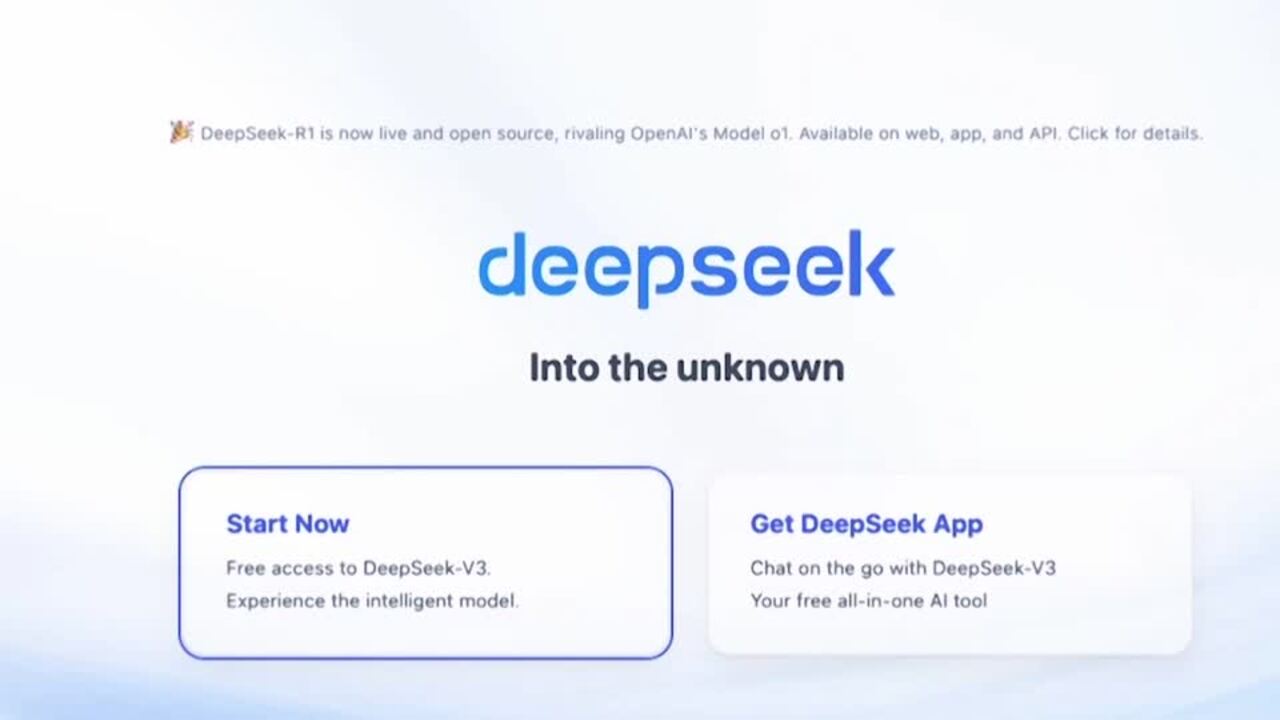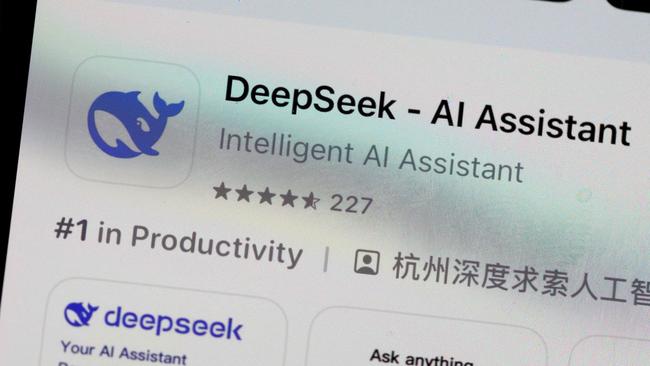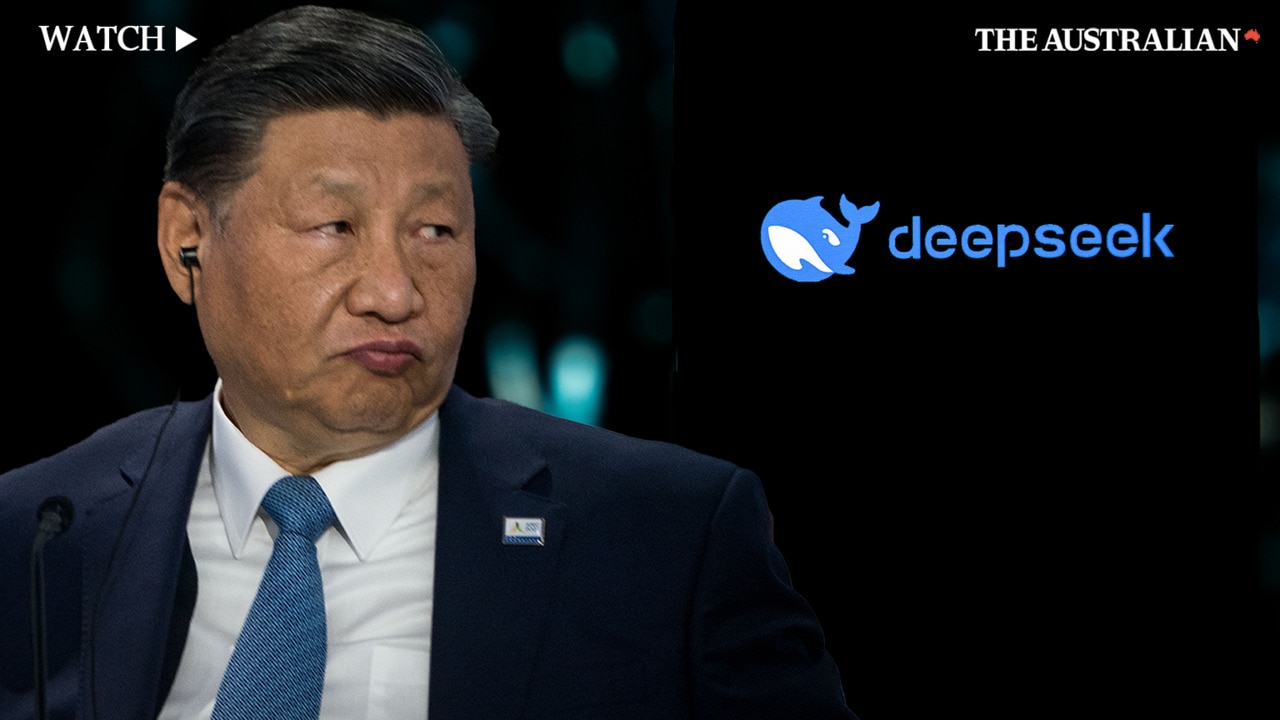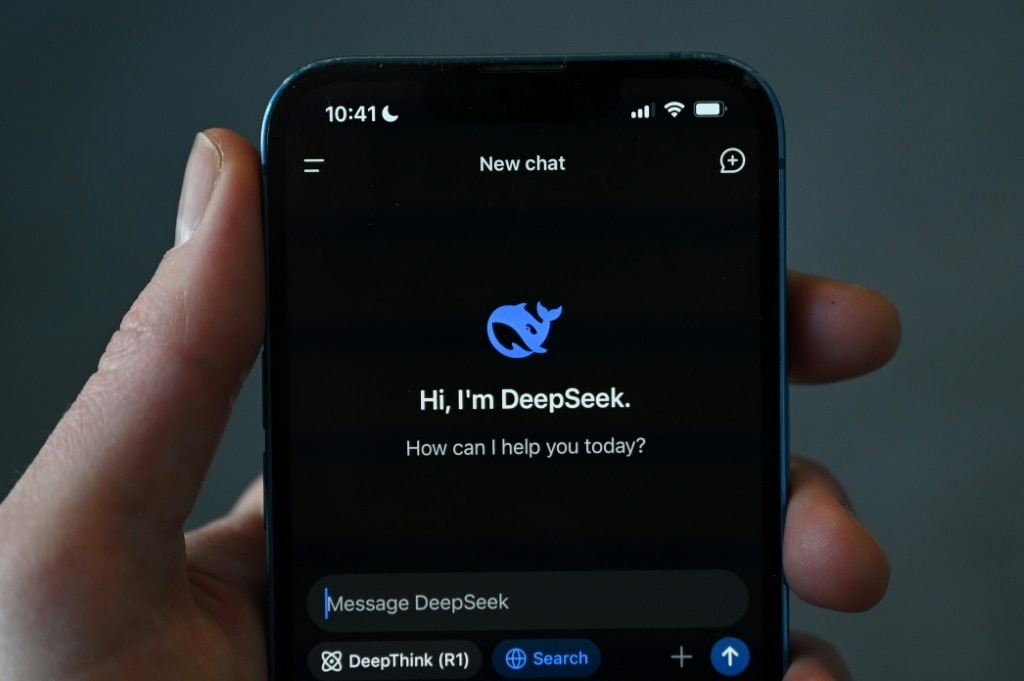Chinese AI start-up’s trillion dollar hit of tech’s ‘Magnificent Seven’
The arrival of cut-price Chinese rival to ChatGPT has seen more than a trillion dollars wiped from the value of major tech companies.

More than $US700bn ($1.112 trillion) was wiped from the value of the world’s largest technology companies on Monday after the emergence of a cut-price Chinese rival to ChatGPT raised doubts over whether America can sustain its lead in artificial intelligence.
California-based Nvidia, whose share price has been turbocharged by speculation that generative AI would fuel rapid growth in demand for its computer chips, lost $US550bn, and its crown as the world’s most valuable public company.

DeepSeek said it has produced a free open-source assistant that uses lower-cost chips and less data than its American rivals. The latest developments by DeepSeek call into question claims about the level of investment required in AI made by the US tech giants, which have committed to spending billions on building data centres to train and serve large language models.
The Chinese AI start-up claims to have made advances in training models using fewer Nvidia chips than its competitors. In a technical report, DeepSeek said it used a cluster of more than 2000 Nvidia chips to train its V3 model. By contrast, tens of thousands of chips are typically used to train AI models of a similar size. The company’s chatbot, which rivals ChatGPT, rose to the top of Apple’s app store downloads in the US over the weekend.
The results sent shockwaves through markets, dealing a blow to most of the so-called Magnificent Seven — Alphabet, Amazon, Apple, Meta Platforms, Microsoft, Nvidia and Tesla — which have seen their valuations balloon on hopes that they can capitalise on the AI revolution.

The tech-focused Nasdaq Composite declined 3.5 per cent, or 693.3 points, to 19,260.99 in early trading in America, while the S&P 500 was 1.9 per cent, or 116.5 points, lower at 5984.68.
Aside from Nvidia, those most geared towards AI, Google-parent Alphabet, Amazon and Microsoft, lost $220bn in value.

“Clearly you see here the consequences of extreme concentration, extreme positioning. And you just need one event like today, which can represent a risk over the long term for the dominance of large-cap US tech companies involved within the AI ecosystem,” Elyas Galou, an equity strategist at Bank of America, the investment bank.
Apple was the only riser among the group of seven stocks, seemingly because it is seen as having fewer machine learning applications, a characteristic that had been viewed as a negative that risked the iPhone maker being left behind in the AI boom.

Shares in the Dutch chip maker ASML declined 7 per cent in early morning trading in Amsterdam, while the Stoxx Europe 600 technology index slid by almost 6 per cent in morning trading before regaining most of its ground to close 0.07 per cent lower. In Asia, shares in Tokyo Electron, the chip-making equipment supplier closed 4.9 per cent lower.
Funds focused on technology also suffered on the FTSE 250, with Allianz Technology Trust and Polar Capital Technology Trust closing more than 5 per cent lower. Scottish Mortgage Investment Trust, whose growth-focused portfolio includes stakes in Amazon, chipmakers Nvidia and TSMC, Temu owner PDD Holdings and Spotify, lost 5.2 per cent on the FTSE 100. Baillie Gifford US Growth Trust and JP Morgan American Investment Trust also closed down more than 2 per cent.Satya Nadella, chief executive of Microsoft, sought to allay concerns over the impact that DeepSeek’s technology could have on the AI industry, suggesting that efficiency gains could boost consumption rather than quashing demand.
“Jevons paradox strikes again! As AI gets more efficient and accessible, we will see its use skyrocket, turning it into a commodity we just can’t get enough of,” he wrote on X.
Microsoft has said it would invest $80 billion this year in building new data centres and has invested about $13 billion in OpenAI.
Marc Andreessen, the Silicon Valley venture capitalist, said in a post on X that DeepSeek’s R1 model was AI’s “Sputnik moment”, referencing the former Soviet Union’s launch of a satellite that marked the start of the space race in the late 1950s.
“Deepseek R1 is one of the most amazing and impressive breakthroughs I’ve ever seen and as open source, a profound gift to the world,” he wrote.
Nvidia sought to allay concerns, saying in a statement that more of its chips would be needed and that “DeepSeek’s work illustrates how new models can be created … leveraging widely-available models and compute that is fully export control compliant”.
The sell-off comes at the start of a busy week of earnings updates for American technology companies, with quarterly results from Meta Platforms, the owner of Instagram and Facebook, and Microsoft due to report on Wednesday and Apple releasing results for the December quarter on Thursday.
However, DeepSeek announced on Monday afternoon that it would be restricting sign-ups for its chatbot service following a cyberattack.
“Due to large-scale malicious attacks on DeepSeek’s services, we are temporarily limiting registrations to ensure continued service,” the company said. “Existing users can log in as usual. Thanks for your understanding and support.”
DeepSeek’s statement described the issue as affecting the software interface of the program, rather than as a data breach.







To join the conversation, please log in. Don't have an account? Register
Join the conversation, you are commenting as Logout